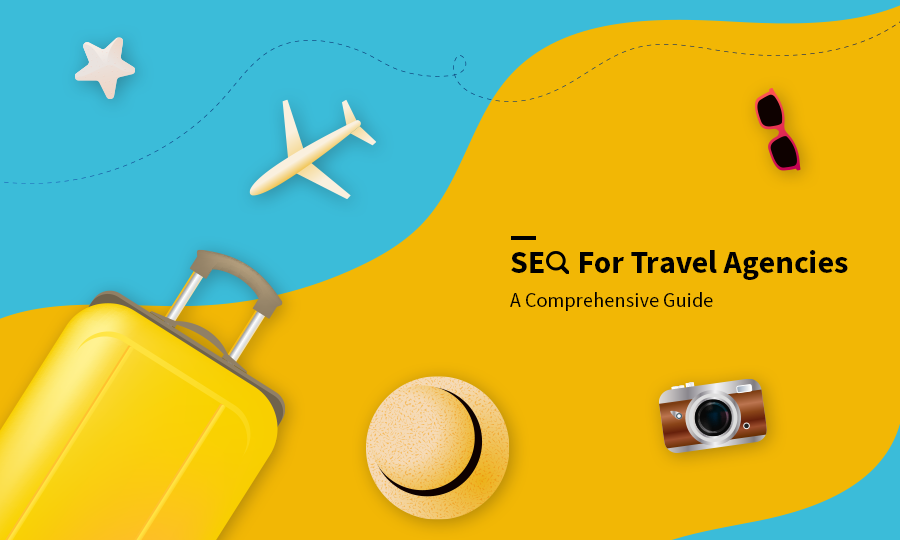In this digital age, most travelers turn to the internet to gather information and plan their next trip. Travel agencies are going digital and what better way is there to increase their online visibility? In this situation, the importance of Travel SEO cannot be overstated.
SEO has the power to guide travel brands and help them steer towards success amidst so much competition. Travelers heavily rely on Search engines like Google, Yahoo and Bing to learn about local experiences, accommodations, and other necessary information about their travel destination.
This makes travel companies fall back heavily on travel SEO. Better SEO efforts will allow them to improve their website rankings and win over competitors much faster.
Travel SEO is an extensive set of digital marketing strategies and techniques designed to improve visibility in search engine results. It entails using strategies like keywords, on-page optimization, off-page link building and local SEO efforts.
These tactics work together to elevate a travel agency’s website traffic and rankings and ultimately lead to increased sales.
In this guide, we will dive into the intricacies of travel SEO and explore the processes and benefits that travel brands need to understand to thrive in the digital landscape.
What is SEO for Travel Agencies?

SEO for travel agencies is a set of efforts that aims at augmenting the online visibility of the travel agency. The process of travel consists of competitor analysis, keyword research, content creation, backlink building, technical SEO efforts and measuring results. It’s an elaborate process that can take months.
Search engine optimization is a part of digital marketing. As travel agencies happen to be there in every corner of the street, capturing online leads is necessary to boost your business. This is exactly what SEO does for travel companies.
When a travel company uses SEO, the main target is to boost the online ranking on the search engines to boost the footfall of organic traffic.
Why is SEO for Travel Agencies Important?

Travel SEO is super important for improving your travel website. When people look for information about their journey, Travel SEO acts as the compass guiding your online journey in the highly competitive travel industry.
In a world where travelers increasingly rely on the internet to plan their trips, having a strong online presence is non-negotiable. Travel SEO helps you navigate this digital landscape effectively.
Without SEO, your travel agency’s website may be buried beneath countless others in search engine results. Travelers seldom venture beyond the first few pages of search results, so ranking higher is imperative.
Travel SEO techniques, such as keyword optimization and content creation, ensure that your website appears prominently when potential customers search for travel-related information or services.
Trust and credibility are also paramount in the travel business. Travelers want assurance that they are making the right choices. Effective SEO includes strategies like garnering online reviews and showcasing your expertise, which can help build trust with potential clients.
The cost-effectiveness of SEO cannot be overstated. SEO provides a long-term, sustainable way to attract customers without incurring high advertising costs when compared to traditional advertising. It’s a strategic investment that continues to increase ROI with time.
Travel SEO keeps you in tune with changing customer behavior and trends. By analyzing keyword trends and user behavior, you can adapt your marketing strategies accordingly, ensuring your travel agency remains relevant in a dynamic industry.
5 Must-Do Steps Every Travel Agency Should Follow

Travel SEO requires proper planning and the execution of several well thought strategies. The success of your SEO efforts depends on how well these strategies have been implemented on your website. The most important travel SEO steps include the following:
1. Keyword Research for travel agencies:
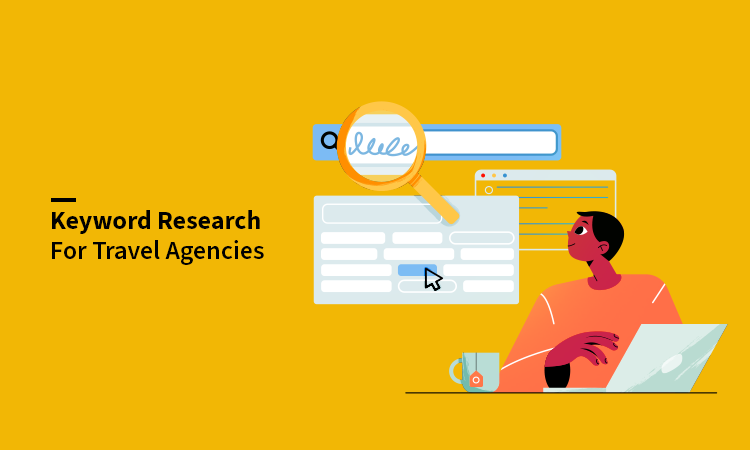
Keyword research is one of the most important steps in SEO for travel companies. It involves identifying the most relevant keywords and phrases that travelers type on search engines when searching for travel-related information and services online. These keywords can be used to improve your search engine rankings.
Travel SEO keywords are one of the best SEO practices to increase your ROI. Let’s explore the process and benefits of keyword research for travel websites.
a) Know Your Keywords:
Use Google Webmaster Tools and Google analytics to know the most relevant keywords related to your niche that have the highest search volume.
Pay attention to the search volume and other metrics. By targeting appropriate keywords, you increase your chances of ranking higher in SERPs. This makes it easier for travelers to find your website among millions of others.
Keyword-optimized content attracts organic traffic from users actively searching for travel information and services, resulting in more potential customers.
b) Start with your target audience:
Brainstorm a list of keywords related to your travel agency. Consider your target audience, their search queries and the intent behind those.
Tailor your content marketing and optimization strategies accordingly. Ensure that the keywords you choose are highly relevant to your services.
c) Competitor Analysis:
Other websites in your niche that appear at the top of search engine results pages are your biggest competitors. Analyze the keywords your competitors are targeting.
Tools like Google Keyword Planner, SEMrush, or Ahrefs can help you identify the keywords that your competitors are ranking for.
d) Long-tail Keywords:
Long-tail keywords are longer, more specific phrases with a high search volume that often have less competition.
For example, instead of writing “Goa vacation,” consider writing “Family-friendly beach vacations in Goa.” When you use long-tail keywords, it can help attract highly targeted website traffic to your own site.
e) Keyword Mapping:
Group your keywords into categories or themes. Create a plan for how you will use these keywords on different pages of your website. By targeting and planning the right keywords, you can improve the search engine rankings of your travel web pages.
This further aid in attracting more qualified traffic and ultimately increases bookings. Your travel website’s continued success is all determined by the online world.
2. On-Page SEO Optimization:
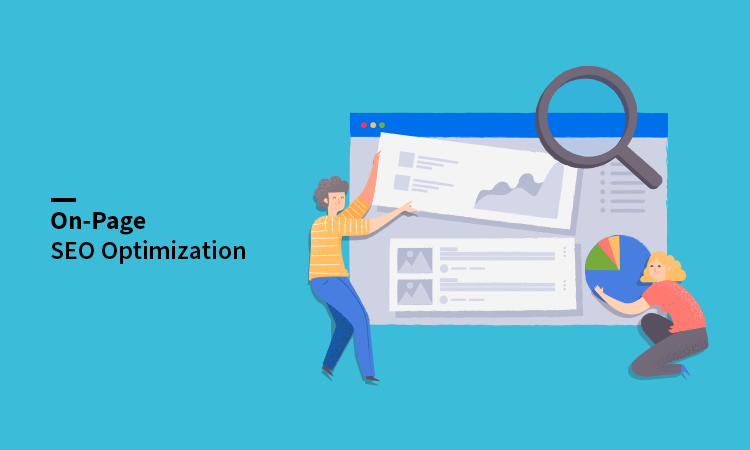
On-page SEO optimization is an essential part of improving your travel business website’s visibility on search engines. It involves optimizing the elements on your website to make it more search engine-friendly and user-friendly.
Here, we’ll discuss the process and benefits of on-page SEO optimization for travel agencies.
a) Create Quality Content:
Your website’s content can attract a larger audience and help you rank higher on search engine result pages. Search engines like Google value fresh and high-quality content.
Develop high-quality, informative, and engaging content that incorporates your chosen keywords naturally. This content can include destination guides, travel tips, and blog posts. Ensure your content is well-structured with keywords integrated into page titles, subheadings, and bullet points.
b) Homepage Optimization:
Optimize your homepage to draw visitors into exploring your offers. Keep the layout simple so that visitors can find things easily. Include necessary information, like your NAP and internal links.
Display your company’s logo, motto and goals in an eye-catching way. Include Meta tags and CTAs. Most importantly, keep testing and updating your homepage’s content continuously.
c) Internal Links:
Your visitors should have no problem finding things on your website. Create a logical internal linking structure within your website. Link related pages on your website to each other.
This helps users navigate your site easily. Internal links also help Google understand your web pages better, thus increasing SEO authority across your content.
d) Meta tag Optimization:
Proper use of meta descriptions and tags helps search engines recognize your content. Optimize all meta tags on your website to help it appear in appropriate results.
This includes the page title tag, which contains your main keyword. Add a brief meta description of the page’s content. This information appears in SERP rankings and increases click-through rates.
e) URL Structure:
Ensure your URLs are descriptive, concise, and include relevant keywords in page titles. Creating a logical and uncomplicated page URL is important. An SEO-friendly URL structure makes it easier for both users and search engines to understand your page content.
3. Off-Page SEO efforts:

Off-page SEO is a set of strategies that focus on improving your travel agency’s online presence outside of your website. These techniques play a crucial role in enhancing your website’s authority and credibility in the eyes of search engines.
Here, we’ll delve into the process and benefits of off-page SEO strategies for travel agencies.
a) Link-building strategies:
The cornerstone of off-page SEO is link building. Link building for Travel Agencies requires special effort. Acquiring high-quality backlinks from relevant websites in the travel industry.
This can be achieved through guest post, blog post, outreach campaigns, and collaborations with travel industry professionals like travel agents and tour operators.
b) Guest posting:
Guest posts are an excellent way to increase exposure for your own travel blog or company. You can create a quality travel blog and post it through the website of guest travel bloggers. Your website will get back linked to the guest website.
As a result, audience engagement will increase on your website as well as the guest blogger. You will gain valuable brand exposure among your web visitors.
c) Social Media SEO practices:
Active participation on social media platforms not only helps you connect with travelers but also contributes to off-page SEO. Sharing valuable content and engaging with your audience on social media can result in increased brand visibility.
d) Online Reviews:
Encourage satisfied customers to leave positive reviews on platforms like Google My Business, TripAdvisor, and Yelp. Provide your customers with future discounts or coupons to motivate them to leave good online reviews for your services. These reviews not only boost your reputation but also impact local SEO.
4. Technical SEO for travel website:
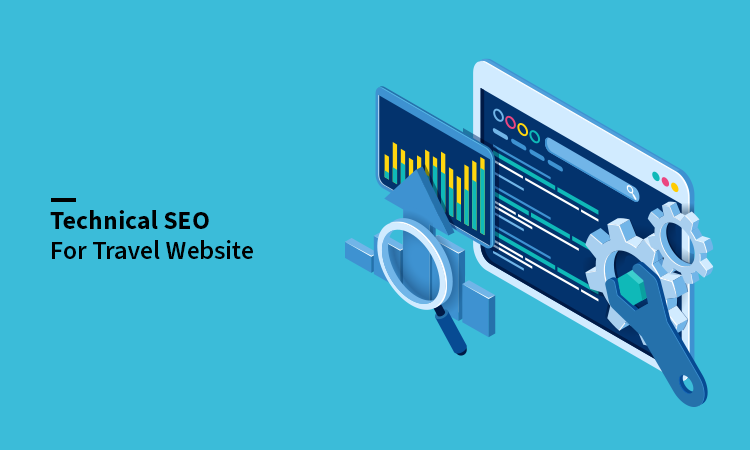
Technical SEO is an essential part of optimizing travel agency websites for Google and other search engines. It entails improving the technical aspects of your site to enhance its search engine visibility and user experience.
Here, we’ll explore the process and benefits of technical SEO for travel websites.
a) Website Loading Speed:
Fix your website’s speed to satisfy potential customers and Google algorithms. Ensuring that your landing page loads quickly is vital.
Compressing images, minimizing HTTP requests, and utilizing content delivery networks can improve your landing page’s loading times. This impacts your travel SEO efforts positively which leads to user satisfaction.
b) Website layout and navigation:
Going around your website shouldn’t be complicated. Users should be able to find what they’re looking for easily. Organize your travel website with a clear and intuitive structure.
A well-structured site makes it easier for search engines to crawl and index your content. This leads to improved rankings.
c) XML Sitemaps:
An XML sitemap is a list of your website’s essential pages and contents. Create and submit XML sitemaps to search web crawlers like Google.
These sitemaps provide search engines with a roadmap of your website’s content, ensuring all relevant pages are indexed. This makes it easy for Google and other web directories to find and crawl relevant content.
d) Schema Markup:
Schema Markup is a code language which helps web directories understand more about your content. This makes your organic search engine rankings better.
Incorporate schema markup to provide search engines with additional information about your travel website. This can improve your travel SEO work and result in rich snippets in search results, improving click-through rates.
5. Local SEO for travel agencies:
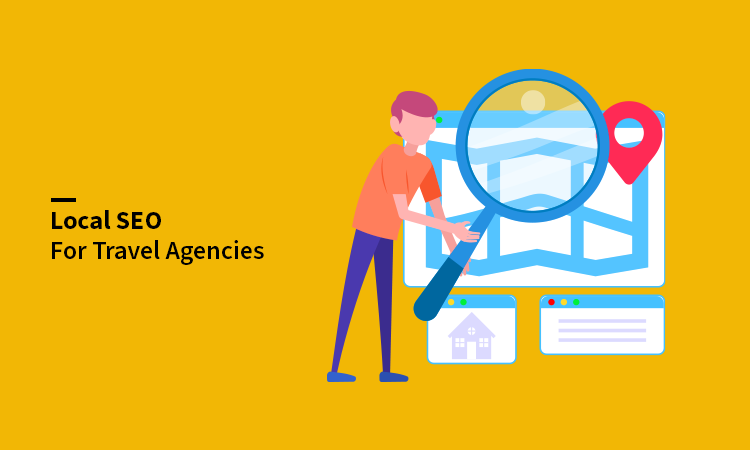
Local Search Engine Optimization (SEO) is a critical strategy for travel agencies looking to attract customers in their specific geographical areas.
It focuses on optimizing your online presence to rank higher in local Google search results. Here, we’ll delve into the process and benefits of local SEO for travel businesses.
a) Local Keyword research:
Identify relevant local keywords and phrases that travelers are likely to use when searching for travel services in your area. Incorporate these keywords into your travel website’s content.
This will boost your travel website’s search engine ranking and popularize your travel services in your local area.
b) Google Business Profile Optimization:
Claim and verify your Google Business Profile listing. Ensure that your business name, address, phone number (NAP), Google maps location and other essential details are accurate and consistent with your website and other online platforms.
c) Local Citations:
Ensure your business information is consistent across online directories, social media pages and profiles, and travel-related platforms like Yelp and TripAdvisor.
These citations contribute to your local SEO authority. Local citations should always be up-to-date. This can contribute to increased SEO rankings for your travel website.
d) Local Link building:
Link building is a great way to increase your travel website’s local reach. Build relationships with local businesses and websites to earn good-quality backlinks. These local backlinks can improve your authority and visibility in local search results.
Measuring the SEO Success of travel websites
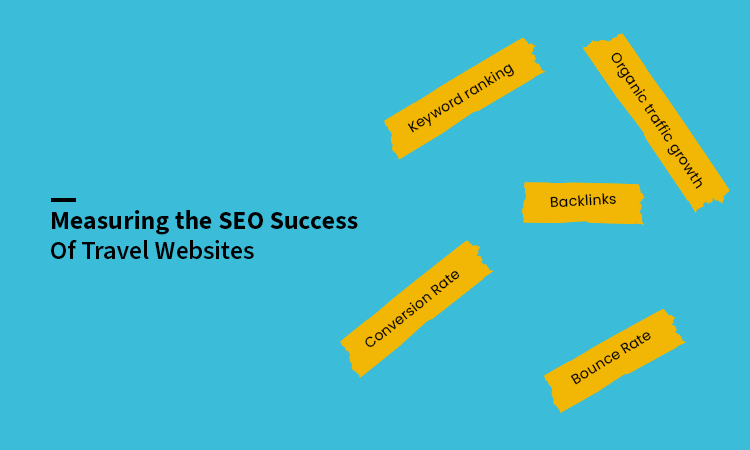
Measuring SEO success is critical for assessing the effectiveness of your travel SEO efforts. This procedure entails methodically analyzing numerous data to determine how well your website is ranking and its effect on your business. Here’s a detailed explanation of the process of measuring SEO success for travel agencies:
1. Keyword ranking:
One of the primary indicators of SEO success is the improvement in keyword rankings. Monitoring your website’s position in search engine results pages (SERPs) for relevant travel-related keywords helps you assess whether your optimization efforts are paying off. Higher rankings generally lead to increased authentic traffic.
2. Organic traffic growth:
Measuring the growth in traffic that is organic is another critical aspect. Increased organic traffic signifies that your website is attracting more visitors from search engines, potentially leading to more inquiries and bookings.
3. Conversion Rate:
Track the conversion rate on your website. This metric tells you how effectively your site is turning visitors into customers. For a travel agency, conversions could include booking inquiries, email sign-ups, or other desired actions.
4. Bounce Rate:
A high bounce rate may indicate that visitors are not finding what they are looking for on your website. Reducing this rate by optimizing content can lead to better user engagement.
5. Backlinks:
Monitor the number and quality of backlinks to your website. High-quality backlinks from authoritative travel websites can boost your SEO strategies.
Future SEO Tips for The Travel Industry

Search Engine Optimization (SEO) is constantly evolving, and it’s vital for travel agencies to stay updated with emerging trends to maintain a strong online presence. Here are some future trends in SEO and their benefits for travel agencies:
Voice Search and AI:
Voice search is becoming increasingly popular with the widespread use of smart speakers and virtual assistants like Siri, Google Assistant and Alexa. Optimizing your travel agency’s website for voice search involves understanding how people naturally speak and incorporating conversational keywords and phrases into your content. Benefits include:
- Improved User Experience:
Voice search optimization enhances the user experience, making it easier for potential travelers to find information about your services using voice commands.
- Competitive Advantage:
Staying ahead in voice search SEO can give your travel agency a competitive edge, as many competitors may lag in this area.
- Enable Voice Search to Boost Local SEO
Voice searches often include location-based queries, making it essential for travel agencies to optimize for local SEO to attract travelers looking for nearby destinations and services.
Core web vitals:
Google now considers user experience an essential factor in ranking. Core Web Vitals, which include metrics like page loading speed and mobile friendliness, are becoming more critical. Benefits include:
- Higher Search Rankings:
Prioritizing user experience and meeting Core Web Vitals criteria can lead to higher search rankings, increasing your website’s visibility.
- Reduced Bounce Rates:
A better user experience keeps visitors on your site, reducing bounce rates and increasing the likelihood of conversions.
- Mobile Optimization:
As travelers often use mobile devices, optimizing for mobile friendliness ensures your site caters to a wide audience.
Content marketing strategy:
Google values high-quality content that demonstrates expertise, authoritativeness, and trustworthiness. This is particularly important for travel agencies, as travelers seek reliable information and recommendations. Benefits include:
- Credibility:
Producing content that showcases your agency’s expertise and authority in the travel industry can establish trust with potential customers.
- Better Rankings:
Google rewards content that meets E-E-A-T criteria with improved search rankings, ensuring your travel agency’s content reaches a broader audience.
- User Satisfaction:
High-quality, trustworthy content provides valuable information to travelers, enhancing their satisfaction and increasing their likelihood of booking your services.
Frequently Asked Questions:
There are several steps to identify the relevant keywords for your travel website. The keywords can be identified by finding the target audience and analyzing the keywords used by competitors. The rule of thumb is to find out travel related keywords that have a high search volume and low competition. Using long tail keywords sparsely in your content can give you an edge.
Some common SEO mistakes to avoid for travel agencies are: Ignoring Web pages and Mobile Optimization, Using repetitive content and neglecting the website security.
SEO is a long-term process. When you hire a good SEO agency, it typically takes about 1 – 3 months to start bringing in positive results for your travel company.
Hiring an SEO expert or agency can be beneficial for your travel business in the long run. They have the experience, training and tools in the realm of SEO. Doing it yourself would require you additional expenditures on resources and teams. This can even take your focus away from your travel company.
Conclusion
In today’s digital age, the success of a travel agency significantly depends on its online visibility. Professional SEO agencies specialize in crafting SEO strategies for travel businesses, ensuring that your services reach a broader audience.
In this competitive market, enforcing SEO strategies is a necessity. Implementing travel search marketing and SEO can ensure that potential travelers can easily find your services when planning their trips.
Your travel website needs an effective SEO strategy regardless of whether you’re a small agency or a well-established brand. It’s a great opportunity to connect with your target audience and drive up sales. Make your travel website SEO friendly today to secure the future success of your travel agency.
In conclusion, a robust online presence is the key to staying relevant and successful in this competitive digital market. SEO is the bridge that connects your travel agency to travelers actively searching for their next adventure. Embrace travel SEO through an agency’s expertise and unlock the doors to a brighter and more prosperous future for your travel agency.
Additional Resources:
- A Handbook for Social Media Marketing for Restaurants
- Social Media Marketing for Hotels: A Complete Guide


